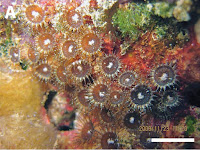Scleractinian Corals (or Stoney Corals) are colonial or singular Cnidarians that secrete calcium carbonate skeletons, with some colonial forms producing extensive reef systems, each individual polyp sitting in its own cup on the larger colonial strcture, and forming the dominant group of reef-building organisms in modern oceans. They appeared in the Middle Triassic, from an uncertain ancestor (earlier groups of reef-building Corals having gone extinct at the end of the Permian), and by the beginning of the Jurassic were already forming extensive reefs. However not all Sclerctinians are reef-builders, many species are solitary, or form small colonies on rocks or the shells of other animals.
In a paper published in
the journal Paleontological Contributions on 30 April 2015, Rosemarie
Baron-Szabo of the Department of Invertebrate Zoology at the
Smithsonian Institution and the Senckenberg Research Institute, and
Stephen Cairns, also of the Department of Invertebrate Zoology at
the Smithsonian Institution, describe a new species of Scleractinian
Coral from the Miocene Chipola Formation of Calhoun County, Florida.
The new species is named
Sclerangia floridana, where 'Sclerangia' means
'hard-container' in reference to the corallite cups) and 'floridana'
refers to the state of Florida. The species is described from a
series of specimens in the collection of the Smithsonian Institution
orginally described as Thysanus vaughani in 1972, but now
recognized to be a separate species. Sclerangia floridana is
a colonial Coral buding from the outside of the corallite cups. All
specimens comprised small colonies growing on the surface of
Gastropod (Snail) shells alongside Sipunculid Worms.
Sclerangia
floridana, Miocene, Chipola Formation, Calhoun County, Florida,
United States; upper surface of largest colony (1) and close-up of
(2); (3-5) smaller colonies. Scale bars: (1, 4) = 2.5 mm; (2, 3, 5) =
2 mm. Baron-Szabo & Cairns (2015).
See also...
 A new species of Soft Coral from the Republic of Congo. Soft Corals (Octocorals) of the genus Alcyonium form encrusting, lobed colonies on shallow rocky surfaces
in tropical waters. These Corals typically have...
A new species of Soft Coral from the Republic of Congo. Soft Corals (Octocorals) of the genus Alcyonium form encrusting, lobed colonies on shallow rocky surfaces
in tropical waters. These Corals typically have...
The Abrolhos Bank is an area of the Brazilian continental shelf to the
south of Bahia State, noted for its large and rich coral reef fauna and
unique...
Zoanthids are unusual Corals with similarities to both the reef-forming
calcareous skeleton excreting Scleractinian Corals and the larger, free
living Sea Anemones. Most species are colonial, with...
Follow Sciency Thoughts on Facebook.



